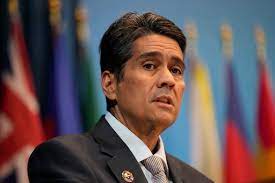The president of Palau said the U.S. military is “reactivating” Palauan airstrips built by the Japanese during World War II, after being asked at a speaking event on Monday if America would have full access to his country if China invaded Taiwan.
Palau President Surangel Whipps Jr confirmed that the U.S military would have full access to Palau under the terms of the free association agreement between the two countries. “Under the compact, the U.S has the ability to come in and use our ports, airports, set up bases, if they need to,” he said.
Whipps said Palau has three runways, and U.S Marines are extending one of them, while the other two can already accommodate C130s, a transport aircraft widely used by the U.S military. “These were all runways that the Japanese used, so they are just basically just reactivating them,” Whipps said.
Whipps also described the Compact Road, a public road built by the U.S that circles the entirety of Palau’s main island, as being constructed for military use. “One of the specifications … is that it should be able to accommodate M1 tanks. The bridges had to be able to accommodate that,” Whipps said.
“So, I think that’s been the intent, and you can see from what the Japanese had during World War II how important Palau was strategically for this type of posturing and security,” he said. We believe that (military) presence is deterrence, or as (former U.S President) Reagan would say, ‘it’s peace through strength’,” he added.
Whipps said Palau values its relationship with Taiwan, and that Palau understands its role in promoting security, which he believes will promote peace.
Under the terms of the Compact of Free Association between the U.S and Palau, the U.S military is provided access to Palauan territory in return for economic aid and security. The U.S also has Compact of Free Association agreements with the Federated States of Micronesia and the Republic of the Marshall Islands, the latter of which is also a formal ally of Taiwan.
Despite welcoming the U.S presence in his country, Whipps also had recommendations for making the partnership work better for the communities of Palau. Regarding the construction of a radar installation by the U.S military, he said simple things to benefit the community could have been done but were not considered.
Whipps said that the U.S preferred not to hire local labor for its development projects, similar to what he had observed in Chinese lead developments. “They had advertised in a newspaper for an engineer to earn US$3.50 per hour (NT$109). If you pay a local worker, you have to pay all taxes. If you bring in a foreign worker, you are exempt from all that,” he said.
He said he had spoken to the U.S Defence Department about these practices and encouraged them to change. He asked, “I know it’s about saving a buck, but when you’re doing that same work in Guam, are those the kind of standards you are applying?”
Whipps also said the U.S should not be surprised by China’s ability to influence the Pacific region as a whole, and that the region needs more U.S investment. “All these U.S investors are flying right over the Pacific and landing in Singapore and Hong Kong, and forgetting about the whole Pacific,” he said.
Whipps added, “In the meantime, what is China doing? They’re definitely flying into the Pacific; they are everywhere in the Pacific. They are down at the very level of where its providing jobs, giving people economic opportunity, and that’s really what China’s strength is.”
Whipps was speaking at a discussion hosted by the Foundation for the Defence of Democracies, alongside Indo-Pacific researcher Cleo Paskal, who said the relationships the U.S. has in the region should not be taken for granted. “Any one of the compact states could completely geopolitically change at the next election. They are all just one election away,” she said.
When asked if that meant changing recognition from Taiwan to China, Paskal replied yes. Whipps also agreed, saying that during elections, China increased its activities in the country, seeking to influence local politicians.
He said it is well known that Palau’s speaker of the house and president of the senate is supportive of China, but said this should not come as a surprise. “You can’t expect when you are starving, not to go looking to other places for food,” Whipps said.
“That’s what I tell my U.S counterparts. Don’t be surprised there are other people offering opportunities. So, what’s important is we have good sound economic plans that build resilience,” he said.
Paskal echoed Whipps’ comments and said that politicians in countries that recognise Taiwan, and in those that have free association agreements with the U.S, need to be supported by the arrangements. “The leaders and would-be leaders of these countries need to be given the justification to show to their electorate why this position is the right one to take,” Paskal said.
SOURCE: TAIWAN NEWS/PACNEWS














